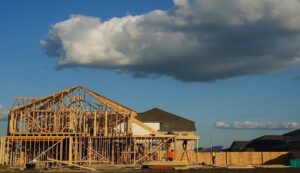Rising home prices across the US have reduced affordability in the country
US: Rising housing costs nationwide have put pressure on the nation’s affordability, driving away many would-be purchasers and forcing Donald Trump and Vice President Kamala Harris to pledge, should they win, to take action to bring down the cost of buying a house.

However, as prices have risen, millions of homeowners nationwide have experienced an increase in the value of their homes over the last several years; this appreciation, according to a first-of-its-kind analysis, may persuade them to vote for Harris in November.
Researchers examined home prices and election outcomes nationally over the course of the last six presidential elections in “Housing Performance and the Electorate,” a study released in early 2023. The goal of the study was to determine how the nation’s “largest asset class, residential real estate,” affected individual voter behavior.
Their original theory was that voters who own property have a tendency to support politicians who they believe would increase the value of their property. They discovered that homeowners were more inclined to “vote-switch” to the incumbent party in counties where prices had increased in the four years before an election. Conversely, counties that performed worse on prices were more likely to support the opposition party.
In swing counties across seven battleground states (Arizona, Georgia, Michigan, Nevada, North Carolina, Pennsylvania, and Wisconsin), voter behavior was more affected by changes in home prices.
When the survey was released, it implied that homeowners in battleground states would be more inclined to support President Joe Biden in November based alone on the study’s findings. This same idea may support the vice president now that Biden has dropped out of the campaign and Harris is the Democratic candidate.
According to Alan Tidwell, an associate professor of finance at the University of Alabama and co-author of the 2023 research, “voters consider their financial circumstances when making decisions at the ballot box,” a media report said.
“Generally speaking, a strong economy helps the ruling party, whereas a weak economy lends more support to the opposition. In a similar vein, our results on home prices imply that residential real estate performance has a genuine and noteworthy marginal influence on national elections,” he said.
“Voters are likely to respond favorably to rising housing prices—and housing equity— attributing these gains to the incumbent candidate and political party,” Tidwell said.
“Both the incumbent candidate, if seeking reelection, and the incumbent party benefit from this effect, though it is more pronounced when the incumbent candidate is on the ballot.”
Despite not being the incumbent, Harris still has an edge against Trump since she served as Biden’s vice president for the previous four years, at least among homeowners.

Redfin data shows that as of July, the median selling price of a house in the United States was $438,837. This is an increase from $422,000 in the previous year and $331,000 in January 2021, the month Biden took office.
According to the 2023 research, there was a stronger correlation between voting behavior and property prices if there had been a rise in prices in the year before to a presidential election.
In each of the seven battleground states where Harris and Trump will face off in November, housing prices have increased throughout the last 12 months. Home prices rose 2.1 percent in Arizona in July compared to 3.3 percent in Georgia, 6.4 percent in Michigan, 6% in Nevada, 2.2 percent in North Carolina, 5.3 percent in Pennsylvania, and 8.6 percent in Wisconsin, according to Redfin.
Content Owners, Disgruntled Tenants
Although the majority of voters, who are homeowners, may be pleased with rising housing costs and continue to support the incumbent, purchasers and renters may have very different opinions.
“Renters, especially those aspiring to purchase a house, may be influenced by affordability concerns, potentially leading to different voting preferences,” Tidwell said.
Concerns over housing affordability and the lack of affordable housing, especially among renters and prospective first-time homeowners, are probably going to play a big part in this year’s election.
According to a May Zillow survey, over the preceding four years, rent prices in the majority of major U.S. urban regions have climbed 1.5 times faster than earnings. Between 2019 and 2023, income increased by 20.2 percent nationwide, while rentals increased by 30.4 percent. According to the most recent statistics from Zillow, the national median rent for all bedrooms across all property types is $2,100, which hasn’t changed from the previous year.
If elected president, Harris has promised to construct three million new houses over the course of four years to close the current supply gap, which would cut home prices in the US housing market. She said that in order to urge local governments to lift restrictions on new development, she would quadruple the $40 billion in funds available and provide tax advantages to homebuilders that cater to first-time buyers.
Trump has said that he will halt illegal immigration to lower demand for houses and free properties for Americans, but he has not provided many ideas on how he would handle the present housing affordability problem if elected.
According to Tidwell, “a substantial wave of new construction is necessary to meet growing demand, especially after years of underbuilding that followed the [2008 and 2009] Great Recession and pandemic.”
“While plans designed to increase housing supply through new construction activities are oriented toward longer-term solutions, the immediate impact on affordability will take time to materialize and for the population to feel its effect,” Tidwell said.
“More short-term measures, such as policy initiatives aimed at tax incentives, legislative action, or interest rate cuts, could provide quicker relief to renters and potential homebuyers.”
The impact won’t be realized for some time, but it’s unclear how such regulations may influence homeowners’ voting habits should prices drop. Even though there seems to be consensus across party lines regarding the need to expand the housing stock and solve issues with shelter affordability, according to Tidwell, “any policies impacting housing could be juxtaposed across the electorate and resonate differently depending on an individual’s position as a renter, buyer, or homeowner.”
Still a Hugely Open Race
While significant, the housing market will just be one of many considerations for voters in November, according to David Wessel, director of the Hutchins Center on Fiscal & Monetary Policy at the Brookings Institution think tank, who spoke with a media report.

“Housing costs are clearly on the minds of a lot of voters—that’s why politicians talk so much about housing—but I don’t think the outcome of this election will turn on voters comparing the Trump and Harris policy proposals,” Wessel said.
“There are bigger issues at stake—the future of democracy, the nature of U.S. alliances, the rule of law, and abortion rights,” he said. In today’s housing market, there are winners and losers: those who already own a home benefit from growing prices, while those looking to purchase their first home do not. You can do the math, considering that two-thirds of Americans own their homes.”
Less than 60 days before election day, the 2024 presidential contest is still very much up for grabs, according to the most recent surveys. According to polling averages compiled by The New York Times, Harris led Trump in Wisconsin (49 percent to 47 percent), Michigan (48 percent to 46 percent), and Pennsylvania (49 percent to 48 percent) ahead of the first debate between the two candidates on September 10.
With 48 percent of the vote each, the two candidates faced off in Arizona, Georgia, Nevada, and North Carolina.